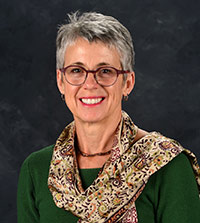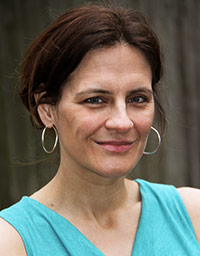What does every researcher need? Uninterrupted time to research and write is at the top of the list. Now, thanks to a generous and prestigious fellowship, two Washington University in St. Louis professors will have abundant time to devote to their research.
Jean Allman, PhD, and Tabea Linhard, PhD, both in Arts & Sciences, each have been named 2014 American Council of Learned Societies (ACLS) fellows. The fellowship provides salary replacement for scholars who are embarking on six to 12 months of full-time research and writing.
ACLS, a private nonprofit federation of 71 national scholarly organizations, is the pre-eminent representative of American scholarship in the humanities and related social sciences. This year, 65 fellowships were awarded to faculty of all ranks and independent scholars. ACLS received more than 1,000 applications for the fellowship this cycle.

Allman — chair of the Department of History, J.H. Hexter Professor in the Humanities and director of the Center for the Humanities — will complete work on her book project, “An Intimate History of the African Revolution: Kwame Nkrumah and the Women in Question.”
Allman will spend part of her leave in Ghana, but most of the time she will be writing in St. Louis. Her fellowship will run from January to August 2015.
Allman will produce a monograph on the role of the intimate and the affective in the consolidation, the disruption and ultimately the historical reconstruction of state power in post-colonial Africa.
Based on private papers and correspondence, newspapers and government documents, Allman’s project focuses on Kwame Nkrumah, the leader of Ghana’s independence struggle and its first prime minister and president. Nkrumah was a major theorist of pan-Africanism and arguably the most important leader of what was known in the 1960s as the “African Revolution.”
During his rule, Nkrumah attracted around him a small cohort of expatriate women. They served in various official capacities but also became his intimate confidantes and remained so, even after the coup that ended his rule. This trusted cohort shaped in profound ways how Nkrumah is remembered today and what evidence historians have at hand to reconstruct not only the conflicted history of Ghana’s first republic, but also the story of the ill-fated African Revolution.

Linhard, associate professor of Spanish, of comparative literature and of international and area studies, will pursue research on “Unexpected Routes: Exile, Migration, and Memory, 1931-1945.”
She will study the relationship between exile, migration and memory by looking at a number of European writers whose itineraries involved Spain, Germany, Mexico and North Africa, and that up until this point, have not been discussed in relation to one another.
By reading these stories of displacement, she will examine how the migratory movements that resulted from the Spanish Civil War and World War II led to new patterns of exclusion and inclusion, forms of cultural memory and intellectual affinities, even in parts of the world considered to be marginal to the history of the conflicts. This project will allow further understanding of the overlooked significance of Spain and Mexico as sites of encounters and exchanges during World War II.
Linhard’s fellowship takes place in the spring and fall of 2015. She will be researching and writing in St. Louis in the spring, and then she will head to Berlin in fall 2015, with additional trips to Spain and Mexico. In addition to writing a book, she also will create maps of exile routes, both as a way to visualize the research and as a means to understand how clandestine border crossing shaped the cultural memory of exile and displacement in the 1930s and 1940s.
For information on the ACLS fellowship, read more here.